Watermark Conference for Women 2018 (Time's Up!)
- Raji Writes

- Feb 24, 2018
- 6 min read
The energy from 6500 women was palpable as they came together at a critical juncture in the national discussion about the treatment of women in the workplace.
The Watermark Institute, whose mission is to increase the number of women in leadership positions, held a day-long event, “Watermark Conference for Women, Silicon Valley” at the San Jose convention center on February 23, 2018. This year marks Watermark’s 25th anniversary.

Industry leaders from around the world gave podium talks on topics ranging from investigative journalism and human rights law, to comedy and film production. They also participated in panel discussions, led breakout sessions as well as smaller more intimate round tables. The exhibit hall offered networking opportunities, purchases from women-owned businesses, and my personal favorite, professional headshots by Oath.

Opening Keynote Session:
Watermark CEO Marlene Williamson, Silicon Valley Bank CEO Greg Becker, Juniper Networks CEO Rami Rahim, and San Jose mayor Sam Liccardo all spoke eloquently about the disparity in the numbers of women in leadership positions in corporations, and the steps their organizations are taking for equity and parity.
Jodi Kantor, investigative journalist for the New York Times who broke the Harvey Weinstein story 20 weeks ago, spoke of her experience. She compared publishing, particularly pushing the button to publish the Weinstein article, to childbirth: it goes in one direction—there’s no going back. Speaking of “the moral horror of the past 20 weeks” and the “rich, complicated messy debate” that has emerged about various issues, she cautioned the audience to focus on the real problem, which is the abuse of power. Inappropriate texts sent by 24-year-olds are not of the same magnitude.
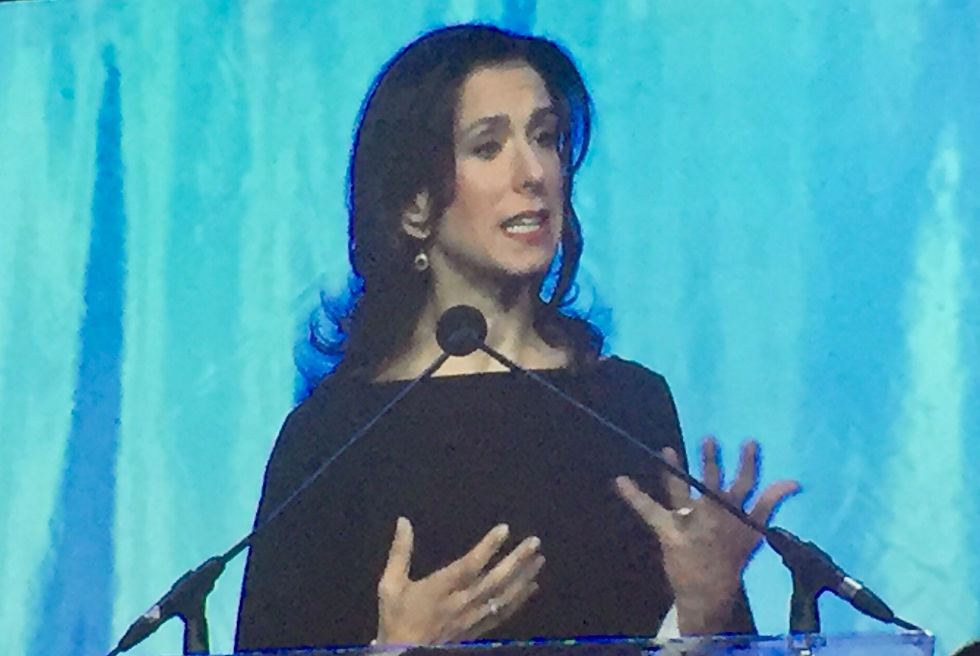
NPR’s Kelly McEvers and international human rights attorney Amal Clooney had the audience’s full attention as they conversed about the trajectory of Clooney’s life and career.

In law school in the UK which Clooney attended, there were more women than men, but with rising seniority, the number of women drop off and at the most senior levels, she was often the only woman in the room at several forums. Speaking of some formidable women in senior positions, she spoke of watching now Supreme Court Justice Sonia Sotomayor, and how inspiring it was as a young lawyer to see her work. She has represented political prisoners e.g. the former president of the Maldives who is the first democratically elected leader after 30 years of dictatorship, the bureau chief of Al Jazeera who is accused of being a terrorist, and a female investigative reporter in Azerbaijan who uncovered corruption by the president and his family, and was blackmailed by video footage taken in her bedroom in a failed attempt to silence her. Clooney’s success in those three cases meant a lot to her.
She also spoke of Nadia Murad, a member of the Yezidi community in Iraq whose women were abducted by ISIS and sold as sex slaves to ISIS commanders through Facebook and online. The Yezidis are not Muslims nor Christians, and ISIS determined that because they have no holy book, they are the worst kind of infidels and can be killed or enslaved. They even wrote a manual for the treatment of captured Yezidis which Clooney referred to as a “bureaucracy of evil where they rationalize barbarism.”
Kelly McEvers remarked that there are lots of documents available to put Isis on trial, to which Amal Clooney replied “That’s the plan.” She added that it shouldn’t be that if you kill one person you go on trial, but if you kill many, the world shrugs. She emphasized the importance of having trials both for the historical records, and to deter future perpetrators. McEvers commented that journalists write the first chapter in history, and lawyers write the second and third. Asked about what advice she had for people who were choosing the path in life, Clooney offered the rocking chair analogy. At the end of life, when you are sitting in your rocking chair and your grandchildren ask you what did you do when… What would you want to say? Clooney expressed her admiration for the survivors of the Marjorie Stoneman Douglas high school in Florida and the #NeverAgain movement to which the Clooney foundation has pledged half million dollars.
Breakout Sessions: In a career advancement breakout session on "How Women Decide" and how to make and implement decisions effectively, the panelists sought to debunk the widely prevalent misconceptions that undermine women’s decision-making, e.g. references to female intuition, female prerogative to change one’s mind i.e. presenting women as less decisive, a figurative “petticoat of stereotypes.” Dr. Vivian Ming, neuroscientist and entrepreneur, made powerful and eloquent points. It has been observed at conferences, she said, that if a woman is the first person to ask a question, more women ask questions. The solution would be to ask the moderator to call on a woman first. She drew an analogy to kids who went to Harvard who are more likely to go if someone from the neighborhood did previously. Discussing the reasons why women leave the workforce, she said one of the strongest predictors was how many women were on the board of directors and the C-suite.
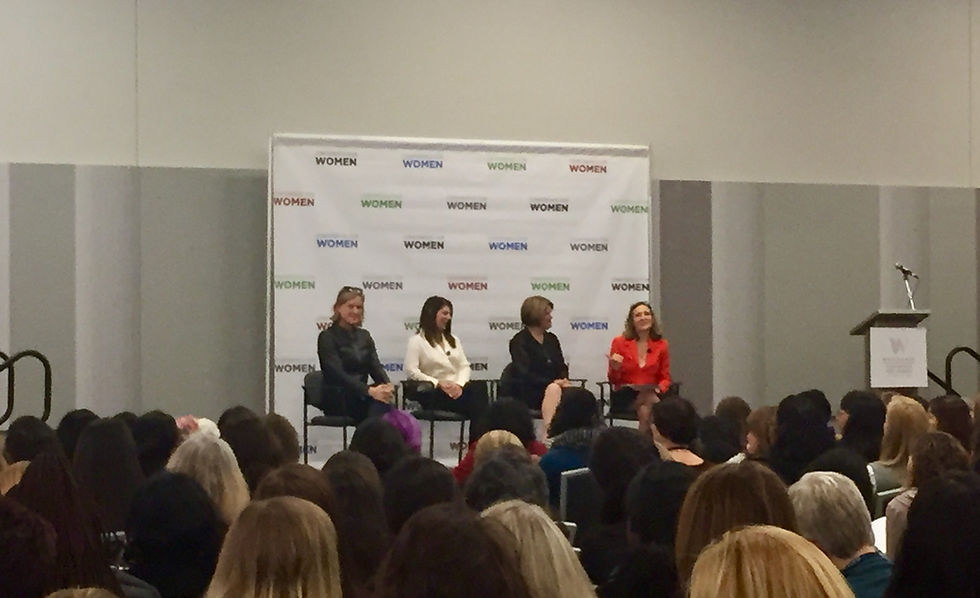
Meredith Krauss of Merck Research Laboratories stressed the importance of male allies in programs for female advancement. Inclusion of men in such programs ensures that men become educated about the disparities, and are empowered to work towards a balanced workforce. This was a welcome theme, brought up in an earlier session by Karen Ashley and Falguni Desai of Cisco who presented the Multiplier Effect Pledge, detailed at www.MultiplyDiversity.com, where if every leader, male or female, pledges to sponsor one diverse person to advance to the next level, collectively we can have a multiplier effect on building a diverse portfolio in the tech industry. Nely Galan, the first Latina president of the US television network Telemundo, shared her path to becoming self made in a breakout session on transitions.
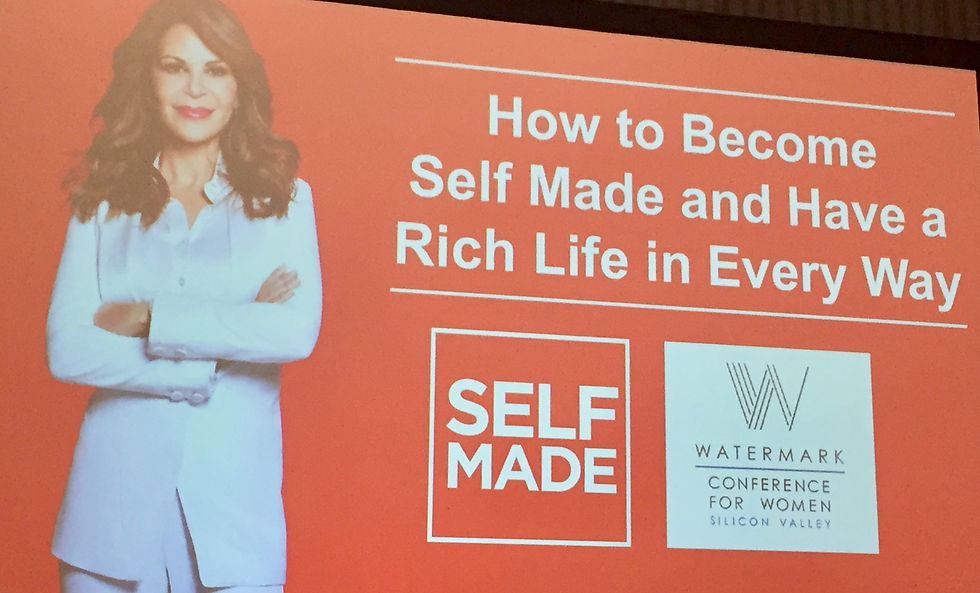
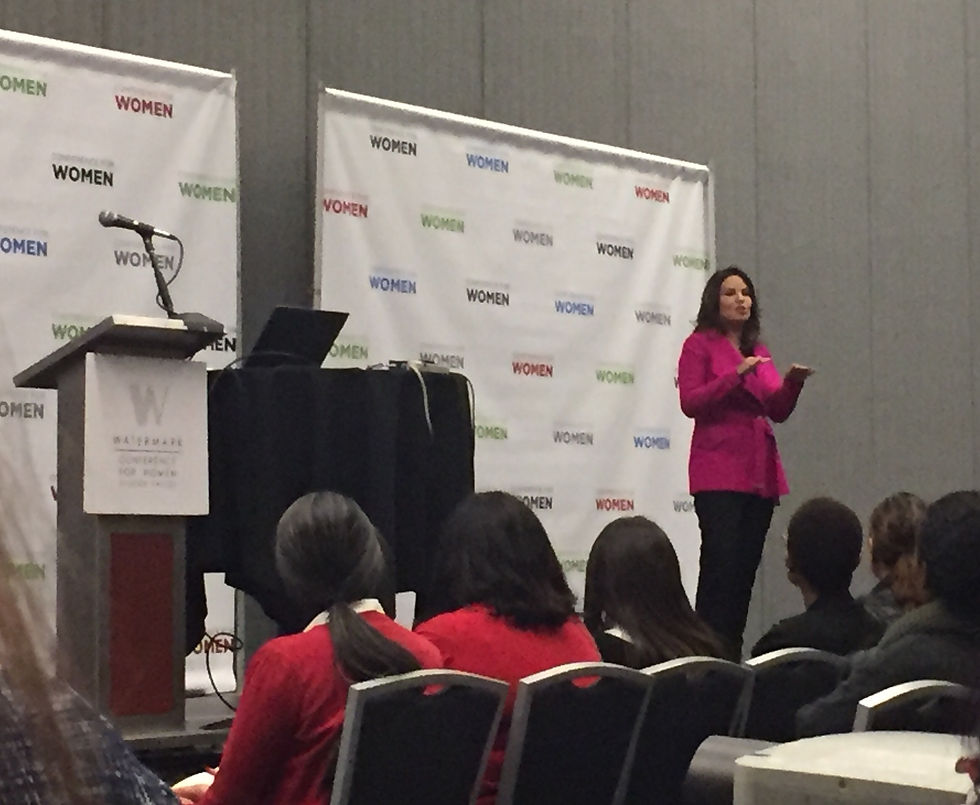
Galan shared her catchy maxim “Don’t Buy Shoes, Buy Buildings“ while laying out paths towards the eventual goal to “Make Money While You Sleep.“ Her charismatic, riveting presentation included practical tips for women to start their own business and broaden their networks. These included joining organizations such as the chamber of commerce, going to events, developing trade skills, and learning to promote oneself. To grow in one’s career and business, she said, one needs to grow first. If you’re not taking classes and learning, you’re not growing.
Luncheon Keynote Session:
Maysoon Zayid, comedian and disability advocate, educated the audience about her cerebral palsy. She offered poignant and humorous tips on what not to ask a woman, including “do not ask a woman if she’s pregnant unless you see a skull coming out from between her legs.” Reese Witherspoon, actor and producer, spoke with Elaine Welteroth, journalist and media personality.
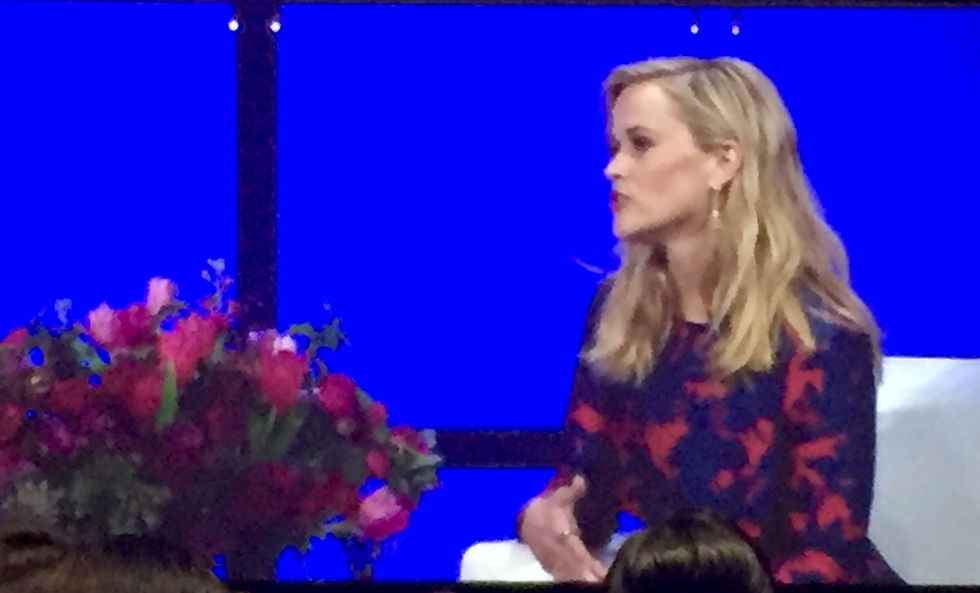
Witherspoon spoke of her dislike for the word “likable" as it held women back from being anything they wanted to be, her epiphany at 40 that she really didn’t care what anyone thought of her, and books that changed her life, e.g. “A Wrinkle in Time, and “Wild” by Cheryl Strayed. She spoke of the beginnings of the Times Up movement, started when about 40 women in the entertainment industry got together after the Harvey Weinstein news broke. Their goal is to make sure that every work environment is safe, across industries. They started the legal defense fund in Washington which raised $20 million in 10 days. The TIME’S UP Legal Defense Fund provides subsidized legal support to those who have experienced sexual harassment, assault, or abuse in the workplace. #TIMESUP. The Fund is housed at and administered by the National Women’s Law Center, to which over 400 lawyers so far are donating their time. The center has now gone global, and is helping women in the UK. Witherspoon had many quotable quotes such as “careers are like jungle gyms not ladders” and “storytelling won’t change until the storytellers change.”
Small Business Roundtables:
These provided a wonderful opportunity for a smaller group to engage in discussions about several topics. I attended three: (i) serving on a nonprofit board, (ii) negotiating, and (iii) persuasive communications for small business owners. In the first, Gail Hunter, VP of public affairs for the Golden State Warriors remarked that fundraising is the main reason people want you on board, and your ability to provide resources from your day job. She stated the importance of knowing the elevator speech as you must be an advocate for the organization. Serving on one of the committees of the organization can give you insights into what it would be like to serve on the board. For a person joining the board the benefits include networking, and exposure to investors as well as members of the local government such as the mayor and council members. Negotiating 101 was led by Dorrit Perry, attorney and adjunct professor of law at Santa Clara University. She mentioned Robert Cialdini’s book on persuasion, and the psychology of why people say yes, and how to apply those insights in negotiations. Conflicts occur when people feel they are not getting respect. She encouraged the participants to go into a negotiation not angry, but as a problem solver. Hope Timberlake, founder of Forte Consulting led the session on persuasive communications for small business owners and provided a framework for such discussions.
As the wine tasting networking reception and author signings began to wrap up the conference, I left to battle rush hour traffic on highway 101 and headed homeward. It was a full day, which left me informed and inspired.



Comments